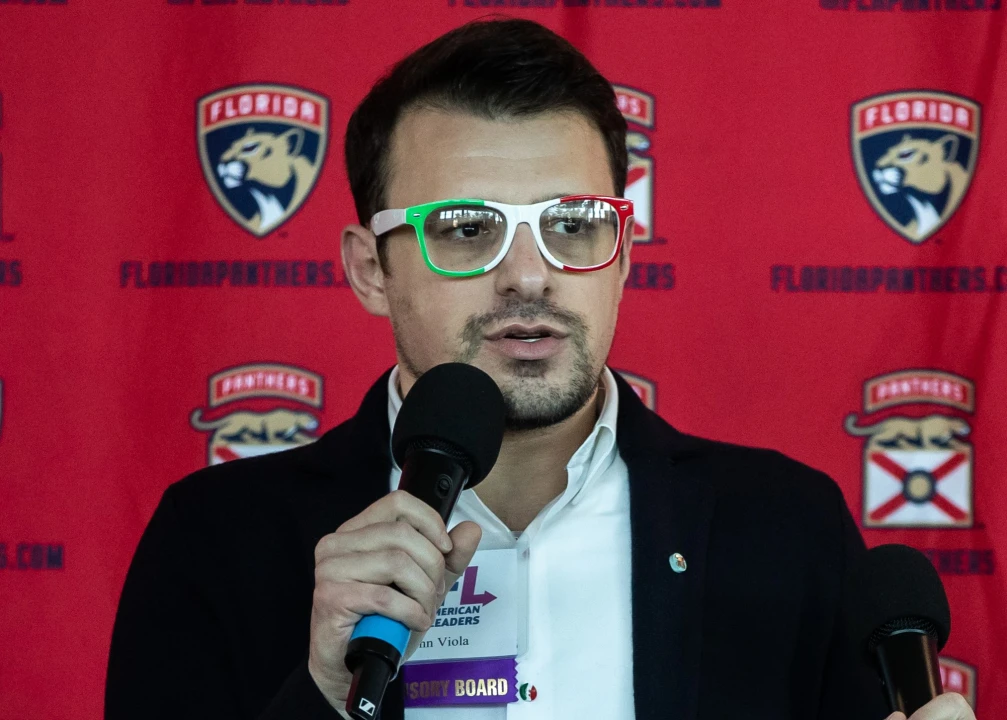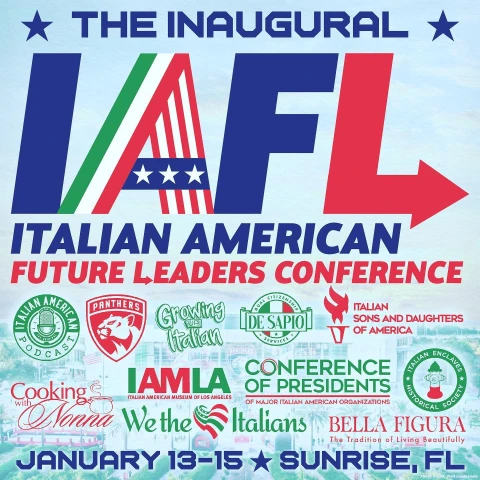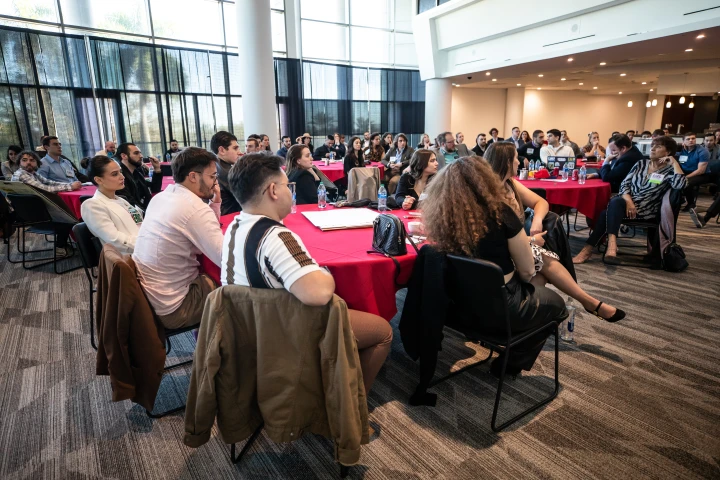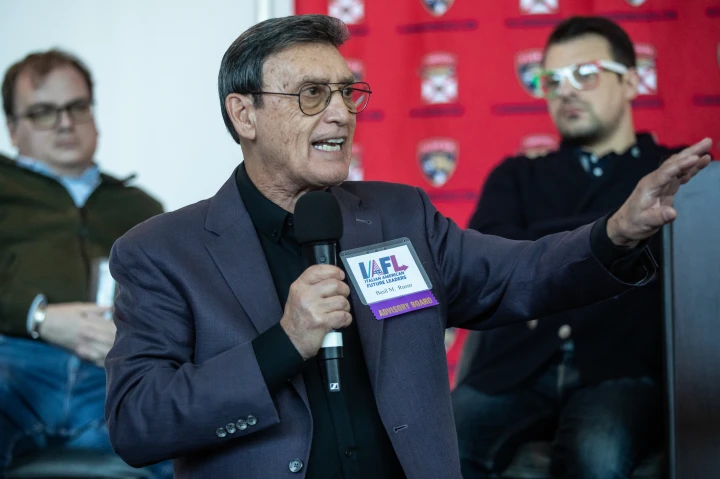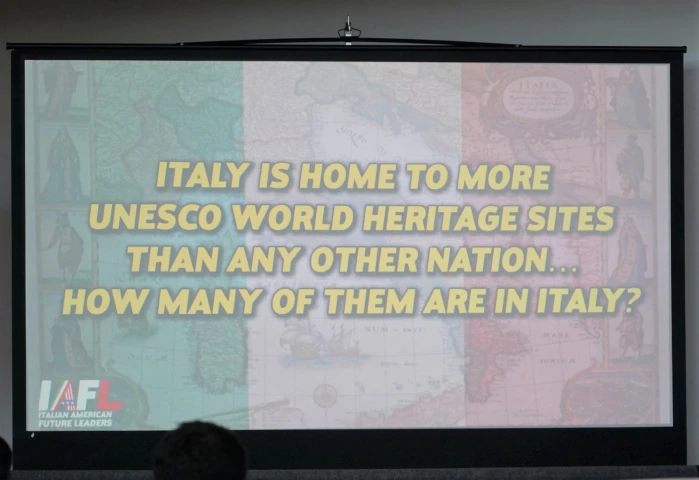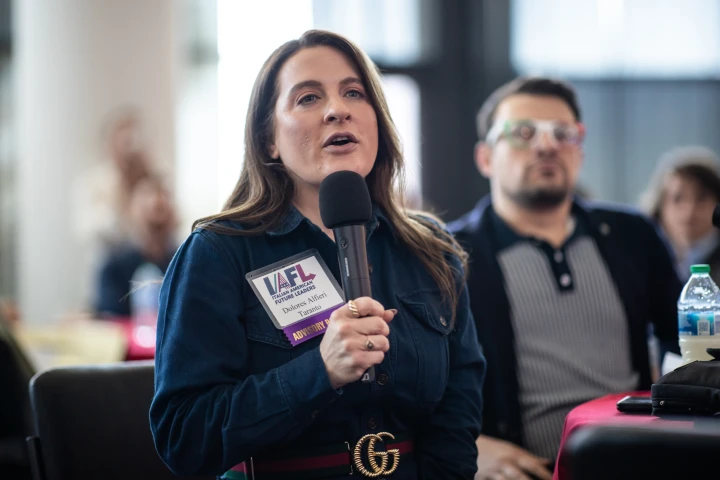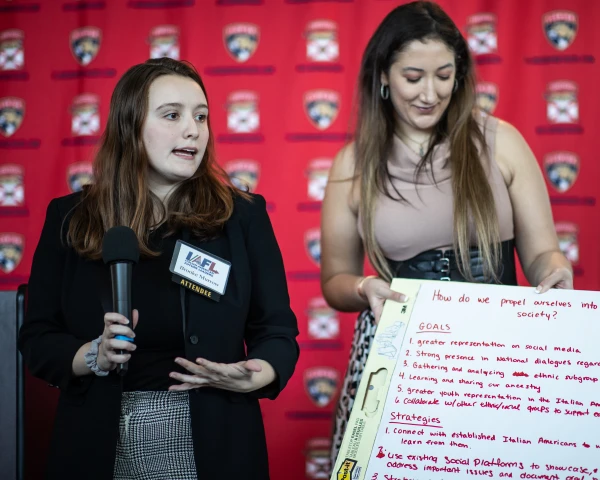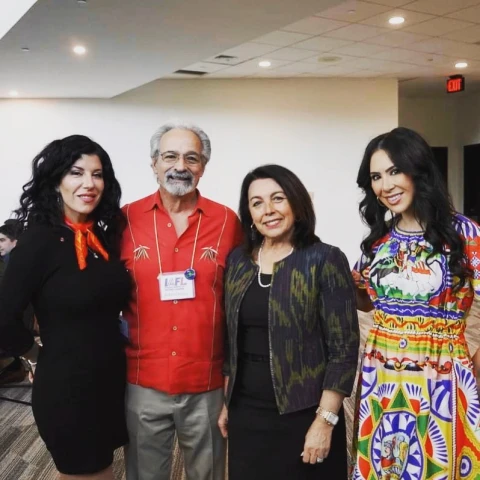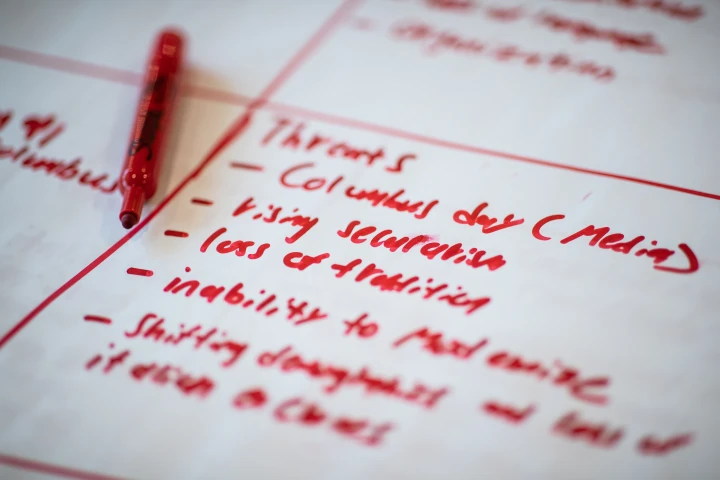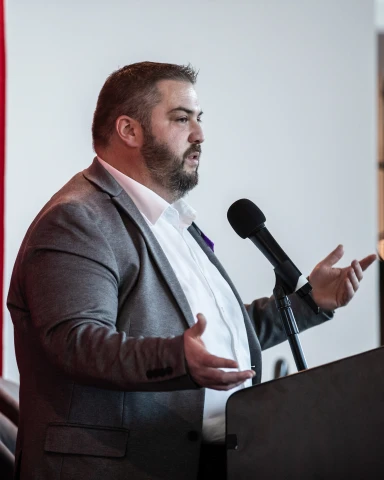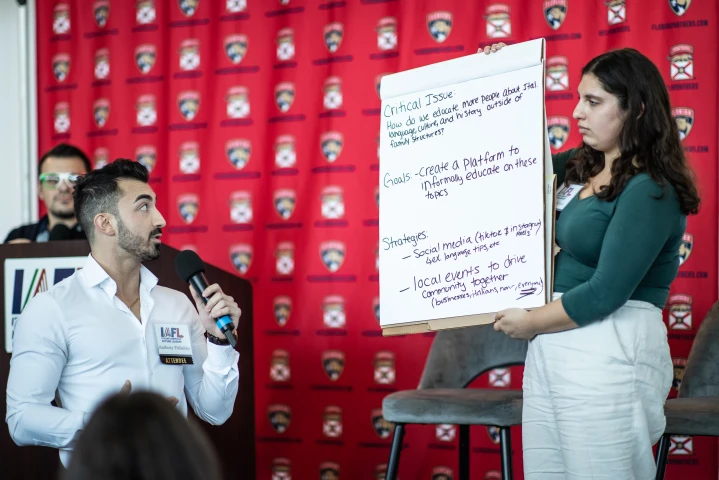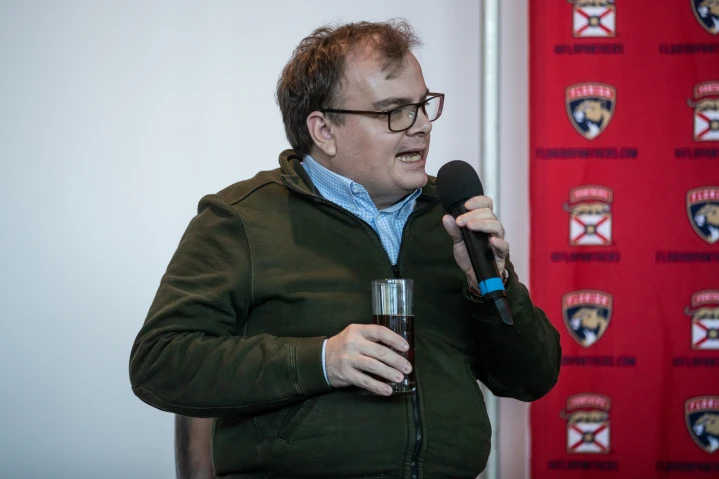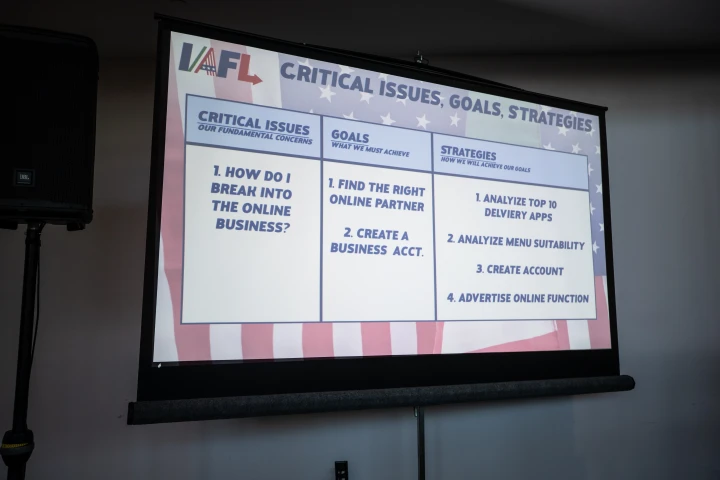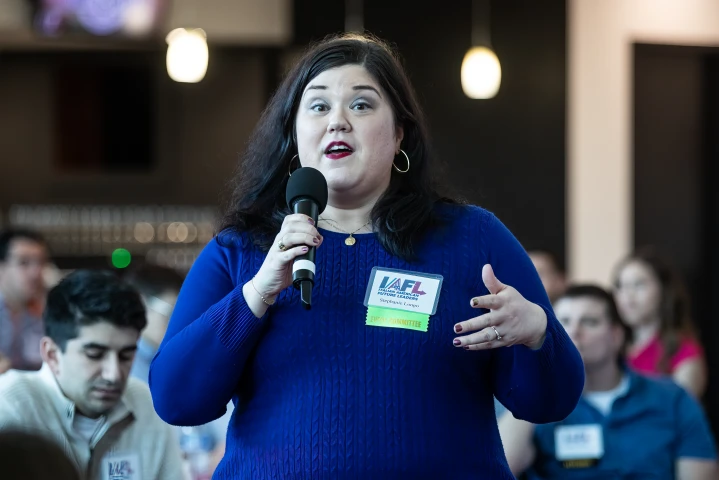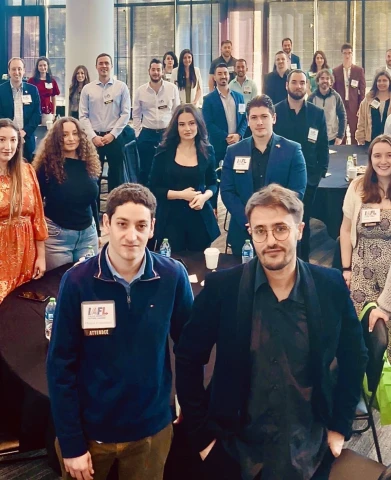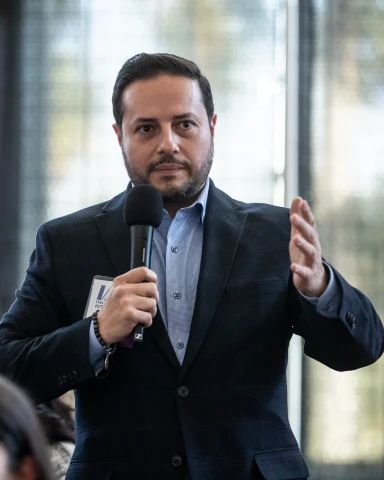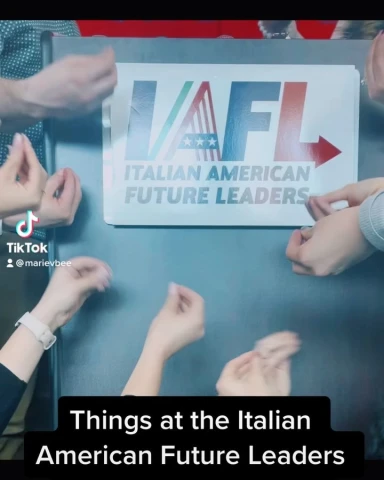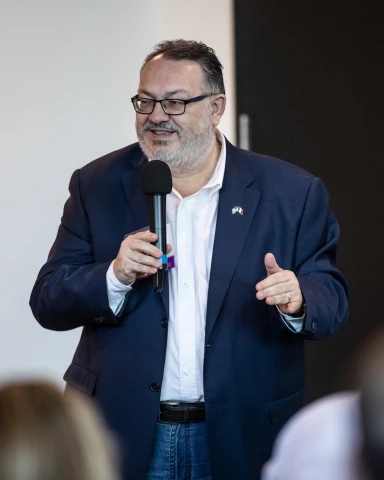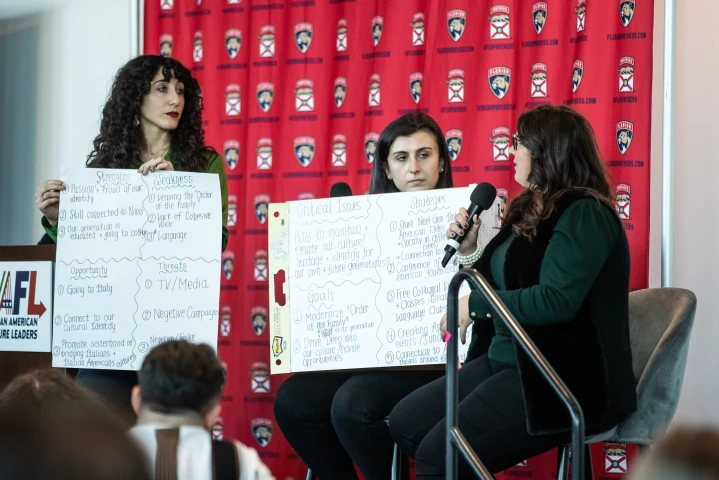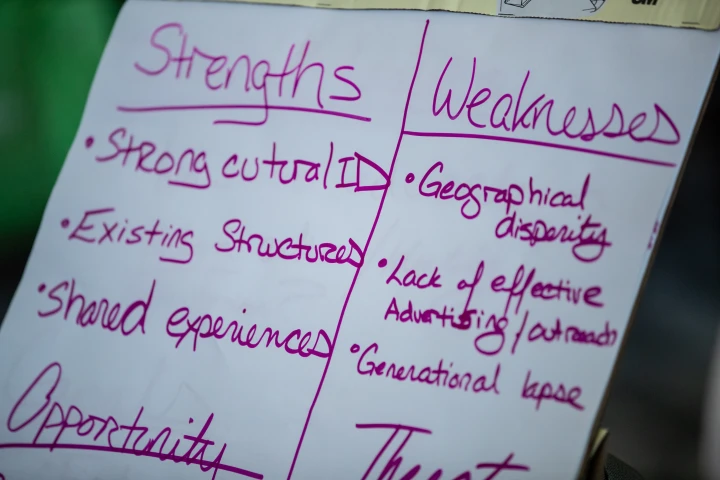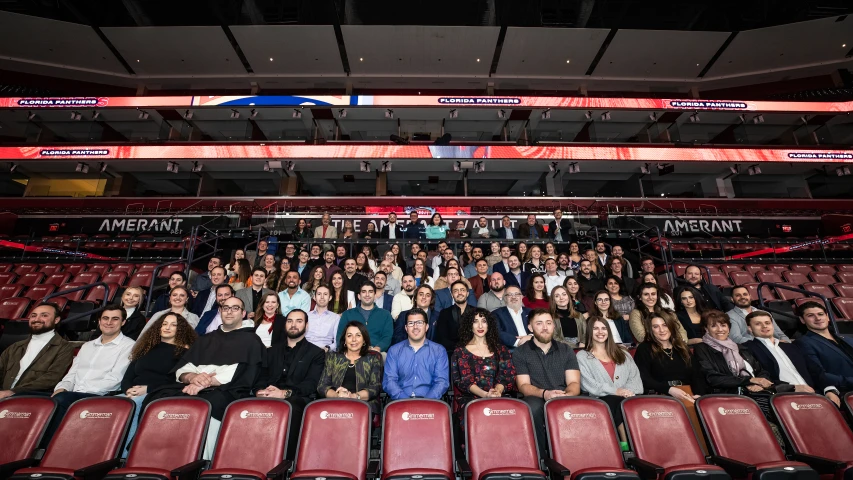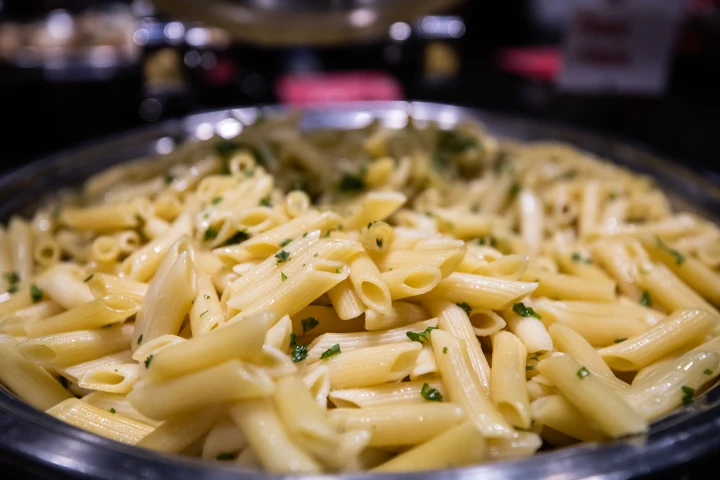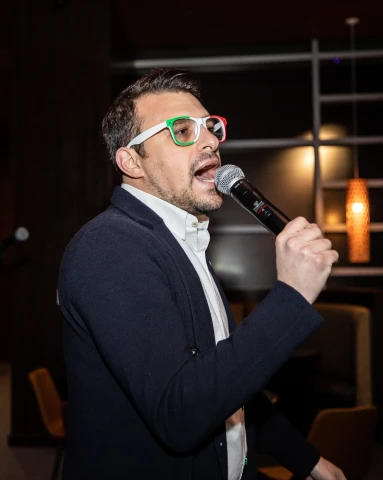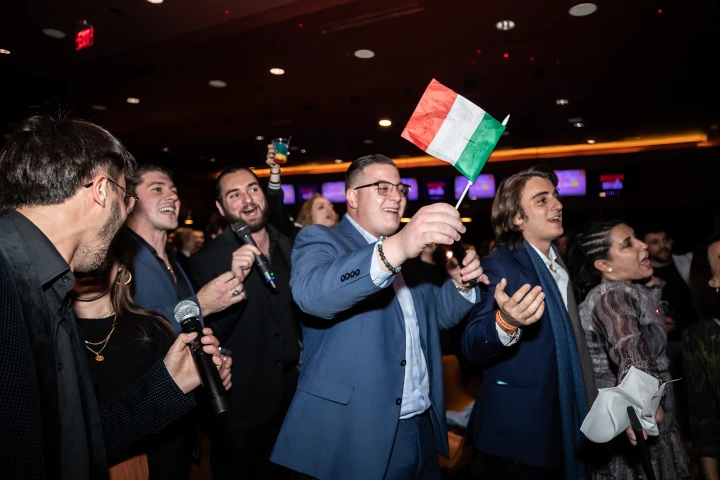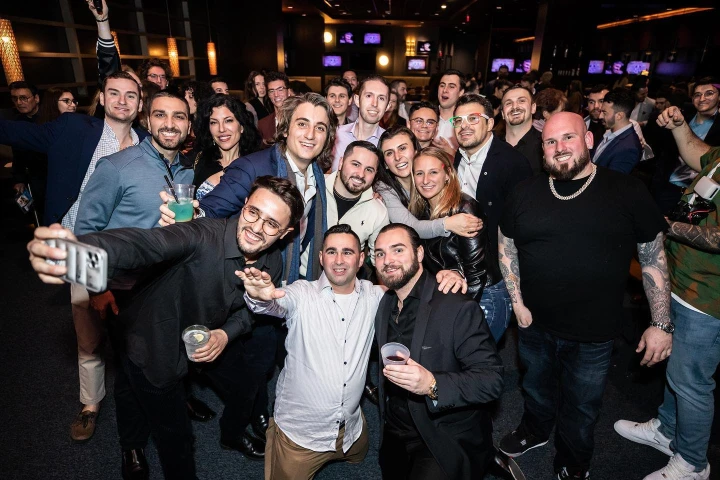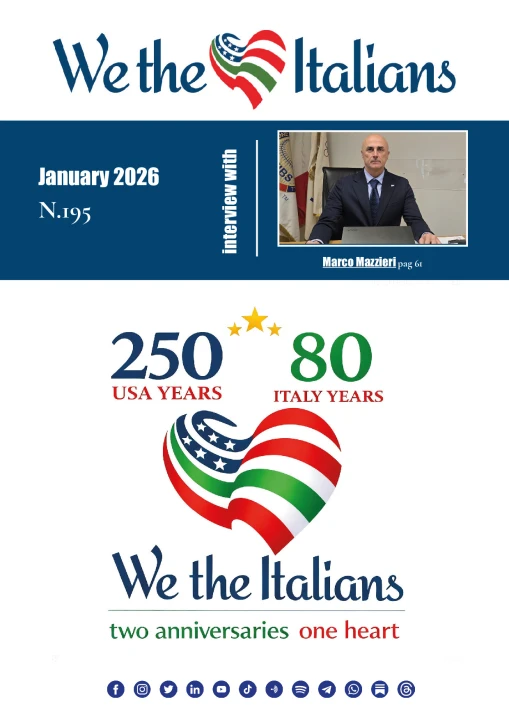Some time ago, while counting the number of interviews published, I realized that I was approaching the three hundredth, and that keeping the current pace I would get there with the second to be published in February 2023. That's why I'm so glad that the 300th interview of We the Italians is this one.
Because it is truly one of the most important and interesting I have ever done, because the subject matter is just wonderful, and the interviewee is someone I have the pleasure and honor to call a friend of mine. John Viola organized the Italian American Future Leaders conference, hosting it in January in Florida. I had the honor and pleasure of participating there, and it was something I will never forget, unlike anything I have ever seen. I really thank John very much and let him have the floor to describe this truly historic event, and I don't use that word casually.
Ciao John, welcome back to We the Italians. How did you come up with the idea of organizing a conference like this? You said your goal is to arrive at organizing an Italamericon, an Italian American version of a Comic-Con...
It's really a combination of a lot of ideas and initiatives from many people. From very early on in my time in the community, I always envisioned a yearly event somewhere in the country that could be the Italian American and Italian equivalent of a Comic-Con or Disney's Convention they do every year, where there are big opportunities for people, brands, and companies to come together and learn, celebrate, interact and network.
It was always a project of mine when I was at NIAF to try to regrow the Expo Italia during their Gala, which in my first year was hosted in a hallway of the hotel with 12 vendors. By the sixth year, we had hundreds of vendors from Italy and the United States with thousands of attendees. It was always a passion project for me because I felt that young people in my generation and generations ahead of me are used to that model - they don't necessarily go to the club every week or every month, but with a once-a-year massive Super Bowl of their passion, they would definitely go.
The youth conference aspect was really born from my friend and partner Pat O'Boyle, who during a Conference of Presidents of the Major Italian American Organizations (COPOMIAO) meeting last fall/winter, put a challenge out that we should be doing something that lowers the average age in the room in terms of representation of the major organizations in the Community, and that brings the next generation of leadership together so they know each other and begin to work together. This would help them to connect and give them the tools they need for when they start to become the heads of these important organizations.
And so, when Pat challenged everybody, Basil Russo asked me and Stephanie Longo - as the head of the youth committee - to put something together. I had this idea for Comic-Con in my head, so we sort of all merged together and this experimental Italian American Future Leaders was born.
I was lucky to attend the conference and I enjoyed it very, very much. Please tell our readers who was there
We chose to only solicit applications through the groups that are part of COPOMIAO, because we didn't know what to expect and we hoped to get 50 participants. We ended up getting almost 100; we had a few cancellations at the last minute, but we got about 100 young Italian Americans between the ages of 21 and 35, many of whom, much to my surprise, were already incredibly active in the national community and their local communities.
We had scholars, doctors, lawyers, we had directors of the Italian American museums, we had every profession from all walks of life and all corners of the United States. It was not just people from the traditional Little Italies, we had people from every community from Iowa to North Carolina and Colorado. It was a really amazing group of very passionate participants who clearly are already committed to leading the community now and in the future. We had some fantastic mentors like yourself and my team from the podcast, including Dolores Alfieri and Rossella Rago, “Growing up Italian,” Marianna Gatto from the Italian American Museum of Los Angeles, Ray Guarini from Italian Enclaves Historical Society, Saverio Nestico from Filitalia International, Jennifer Caito-Ellingson from the Italian American Women of Iowa and Mike De Sapio of DeSapio Dual Citizenship Services. We hand-selected these people, who were available as mentors, as well as resources and coaches. It turned out to be a perfect alchemy to create a weekend of real conviviality and good work.
Can you briefly summarize what happened during this wonderful weekend?
I went into the weekend knowing that it might change and evolve as we were there, and I tried to say that to everyone because, as one of the advisors said, this weekend was really a proof of concept. So, what we set out to do was a little different than what we ended up doing in some ways.
We welcomed everybody on Friday night with the welcoming reception, where we expected them to come and get their welcome package and leave, they ended up staying, mingling, and building relationships early.
Saturday began with Italian American trivia, which we did to separate the crowd into working teams and to give them a sense of how much they do or don't know about Italian American history, heritage, our community, and the current environment. And then we went into a SWOT analysis (strength, weakness, opportunity, threats) around how each of these small groups felt the community looked going forward into the next 10 and 20 years and asked them each to pick one critical issue and present their plans to work on them. It was very interesting to see all 10 groups of participants because many of them had overlapping visions for their most critical issues, but a lot of amazing ideas came out of it, many of which have never been tried before.
We spent Saturday night together at the Florida Panthers hockey game, which was great fun and time for me to relax and enjoy, thankfully, a win for the Panthers.
Sunday began with another round of trivia, this time about Italy, and I had planned to do another SWOT analysis around US and Italy relations based on your keynote on the Italian perceptions of Italian America and on Mike De Sapio's second keynote on dual citizenship. But then I changed my mind, and what I decided to do that morning was another activity that I've done when I hosted leadership trainings. Many of the participants, the day before, had talked about the difficulty of utilizing social media to get the message out, to unify the community, and to promote the organizations that they're part of. On Sunday morning we sent the teams out and asked them to do a social media challenge. Each team had an hour to create a 30-second commercial for next year's IAFL conference and then presented their final products to not only our participants but also to a panel of judges from some of the most successful Italian American social media pages out there: Dolores Alfieri of Bella Figura Podcast, Rossella Rago from Cooking with Nonna, and Rocco LoGuercio and Sabino Curcio from Growing Up Italian. Then, we dissected how effective their videos were.
Later on Sunday afternoon, we had wonderful keynotes from yourself and Mike De Sapio, which I thought all found very, very interesting. Then on Sunday night, we closed the weekend with what I always feel to be two of the most important touchstones of being Italian American. First of all, we had Sunday pasta, and then singing, one of my favorite activities in the world, as part of another great Italian American karaoke night. I think by the end of it, most people didn't want to leave.
Oh yes, you are right! You know, I sent a video via WhatsApp to my wife with me and my daughter singing “Felicità” by Albano and Romina, and she was asleep of course, because of the different time zones. So the next morning, she wakes up, she watches this video, and she sends me a text with a smiling emoticon saying, “Who is this guy? What did they do to you?” because I'm always too serious, you know…
Yes, I saw that too in you and your daughter… I think of so many holidays or Sundays, with my family singing with my grandparents and learning songs from them or singing with my parents and my brothers and cousins. It brings people together, and all these songs are familiar to so many of us. They're in our head, and they relax you, and signing them lets you put down your guard. I think that's what we need to do as a community, to let our guard down if we're going to work together toward solutions.
I felt this throughout the whole weekend, whereas a lot of Italian events that I participate in get very territorial, and when people disagree, nine out of 10 times they end up in kind of a decision to separate or nothing gets done. During the IAFL weekend, I felt that even though there were issues that came up that people didn't agree on, people who had strong and well-informed opinions, the spirit of the entire weekend was essentially that of a really good karaoke night. Let your guard down, give a little trust, and understand that everybody here wants to come out as friends and partners in finding solutions. And that's how the whole weekend was to me.
I am sure that it was the same for everybody! Which were the most important topics addressed, and which ones do you think should be addressed in the future?
I was surprised by the differences between my assumptions going in and what I learned going out from the participants. I was very pleasantly surprised to see, and I felt this for a long time based on my time at NIAF, that we should figure out the right ways to create better access to dual citizenship for the descendants of Italians abroad. It is an opportunity that I think the majority of those who were in Florida are interested in, and I think it's an opportunity that benefits Italians from all over the world, everyone around the diaspora. This would also benefit Italy, so I was very happy to see that that is still a very important issue to the community. I loved seeing their understanding that the future of our community and the future of Italy is one of a diasporic people. And it seems, based on your presentation and everything coming up in 2024 with the year of roots tourism, that maybe, finally, the Italian institutions are starting to see the appeal in that as well. I think these future leaders have a very different sense of "italianità” than what I grew up with, or that of my parents and certainly of my grandparents.
One of the most enlightening “aha moments” of my time doing this as a professional Italian American was their take on anti-defamation because the bottom line was one that I kind of struggled with. The older generation always pushes back against films like “The Godfather” and “Goodfellas” and all these movies, about which many of us then have to hesitantly speak up and say, “but they're beautifully crafted art, cinema,”. We spent decades and money as a community fighting against a very difficult tide, trying to shout down good entertainment, good cinema.
These future leaders I saw in Florida are not offended by those portrayals, but they're vehemently offended when those misconceptions that come from that kind of portrayal around the mafia and crime impact people's real lives as Italian Americans. And they are ready and willing to be active against such instances, and they’re looking for the community to be active. What happens is that we fight the movie premiere, and then when a wonderful hard-working Italian American gets slurred as mafioso by someone for no reason and it costs them their job or their livelihood, we as a community don't act because it's not big and public. That is where these future leaders want to act, and I think that's very wise. First, it made me feel good to understand that they care, and secondly, it made me feel great to understand that they have a more sophisticated approach to it than my generation or prior. So, I felt really, very good about that.
And of course, I think ultimately what everyone came out with was these young people, as I expected, don't really want to go to be part of a group that's going to basically sit there and pat itself on the back and criticize other groups in the community. They don't attach as much significance to what sash they wear or what group they're part of, they just want to work together for the betterment of this giant community, so they have no patience for the infighting that has wracked our community for 100 years.
Yeah, it was very interesting. It was amazing for me because I've done 300 interviews trying to understand the ideas of different leaders older than me or my age, and now I too saw, thanks to this conference, that something new is happening or maybe it already happened. I was so happy I learned something interesting and new.
I've always felt something new was happening from my earliest time in the community, maybe because I was so much younger than everybody else I was working with. Because of the unfortunate socioeconomic conditions of Italy for an extended period of time between the 1870s and 1920s, and then again after the devastation of the war, Italy was sort of forced to cut off 5-6 million of its sons and daughters, the branches of the tree, and send them scattering to the wind. For some reason, like a very hardy fig tree, those branches took root elsewhere, but maintained their Italian fruit. I feel like now those branches are starting to naturally come back together in a smaller, globalized world, where people can virtually interact.
These future leaders are not spending as much time as I may have thinking about that: they're just naturally living this because they see Italy online, they go to Italy. They're not like older generations, where it was difficult to go to Italy. If they don't know the language, they can learn it on YouTube or TikTok. Also, these future leaders are studying Neapolitan and Sicilian other regional languages, as well as standard Italian; to me, they are searching out their roots with digitized records and resources that people before them couldn't even fathom. It's almost like, at least from the Italian American perspective, we are reaching an arm out to Italy to have that branch reunited in its own way. And I am happy to see Italy reaching its own arm back so that we can grasp hands and go into the future as a global Italian community. I truly believe that's happening.
I really felt it was the beginning of something, an event that 10 years from now I’ll remember and say “I was there, when it began.” You guys did something amazing. You took a beautiful picture, and of course the picture is beautiful because of the beautiful subject, but it’s also stunning that someone “saw” that picture where nobody did before, and perfectly shot the photo.
I imagined you felt the same way I did at the end of it, which was very reinvigorated. When we planned it, obviously myself and Basil, we worked with the members of COPOMIAO, and we made a decision early on that we would ask the groups to sponsor the travel for as many participants as they wanted, but we wouldn't open up the conference to the current generational leadership, with the exception of our advisors and a few observers that asked to come. Because, frankly, I wanted to avoid those moments that I've lived through where the old outnumber the young, and as soon as the young put forth an idea, the old jump in and say, “we tried it, and it didn't work.”
I wanted to create a venue where this coming generation of future leaders was in charge of the conversation from the first moment. In some sense, I wish I could have had a soundproof tank, a viewing gallery, to put current leadership in. Because I know myself, and I would guess the same for you, and I can guarantee for all the advisors that I spoke to… that all of us have put so much of our life into this and left feeling invigorated, reenergized.
Let me tell you the quote that Pat gave me, after he came up with this challenge, as we did it on his birthday, “It was the best birthday gift I ever received, because after all these years of fighting for something I believe in, it felt great to know that it's a myth that younger people are not there and involved. Not only are they there and willing, they're better than us in many ways and they're going to have better solutions and the future is not only safe for preservation, it's going to grow.” I do wish I could have included more of the community's current leadership to see this, because it's a vaccination against the pessimism of time.
Did you have feedback from the elder leaders of the Associations that sent their very best young leaders to the conference?
I have had some. I happened to attend a National Organization of Italian American Women event where they honored Rosella Rago a few days after we returned, and I did see some of the people who explained to me that they had heard from the participants and how great everything was. I've certainly received calls from different people in the community telling me what they've heard, and what they've seen. We made an effort to be aggressive on social media. Having partners like the team from “Growing Up Italian” means that you're going to get your message out in a much more productive and widespread way. People have seen videos, they've seen photos, they've seen some descriptions, and I think we've gotten a lot of good feedback.
We've had a couple of calls with the participants, and we are already gearing up for some more events in the future. I get the sense that most of them, if the opportunity is there, will participate again with next year's class of future leaders. I've gotten good feedback, there are some things we can improve, certainly, but mostly there were a lot of people who were pleasantly surprised that we were able to do what we set out to do.
I understand that you guys at the Italian American Future Leaders have already decided to make this an annual event, am I right?
We certainly intend to, but we still have to raise some of the money, so I’ll be happy if any of your readers want to contribute to a long-term endowment for this. What we're going to do is to go out and raise money in two ways.
First, my family and I have committed to hosting the event at the FLA Live arena or one of our facilities down in Florida for the next four years, so for five years total. The big part of any event is having the space and the food, and fortunately we can provide that. Mr. Russo thinks that, between him and myself and our team of advisors, we will be able to raise the necessary funds each year for the next four years, as well as concurrently go out and look to identify donors who want to make substantial gifts to the long-term endowment, so that in the future, this event will always be self-sustaining.
Once that happens, I feel less pressure to have it in Florida, because I would love it to move around the country to where Italian enclaves exist and be able to not only give people a chance to see different places but interact with those communities. Frankly, if we feel like the money is there in an endowment and the operation can pay for itself, it's a lot easier to quickly turn the leadership over to the younger generation, because we've saved them the headache and the risk.
That's our goal, we know we've committed for five years, and I believe in my heart that it should be here 50 years from now and I think it will be. I think there's a lot of goodwill and a lot of positive participation from it. My hope is that five years from now, that would be 2028, we could say, “Next year IAFL 2029 is going to be held in Boston or Los Angeles or Arthur Avenue in the Bronx,” whatever it is, and begin taking the show on the road and being in Italian America with the conference.
I learned a lot from the conference, and so did my daughter who was there representing the students who attended a project by the Italian institution Centro Studi Americani and co-sponsored by the Conference of the Presidents of the Major Italian American Organizations. What did you learn?
That's a great question. I learned that the next generation that everybody says is disinterested is very interested. I expected to see a lot of raw clay, people who cared about their heritage but who weren't participating in organizations, but what I actually found was that the majority of the participants were already very active and successful leaders on a local level and some on a national scale.
I learned that when you're asked to bring in a new generation or a new segment of the population or new attendees, whatever it is, the only way to really do that successfully is to listen and ask questions and take note of how they want to participate. If you go out and dictate, “this is your role, you're in the youth committee,” or whatever it is, you're going to frustrate really good and really thoughtful energy, and you're going to stifle creativity.
And I learned that the future for Italian America is evolving and bright and unique, I think, even after 150 years in this country.
After the great success of this event, what happens now? The message you’re giving is fantastic, to me, because it comes from your heart and because it’s definitely the right thing to do. But how do you let these future leaders “stay together” across the country from now to January 2024?
Well, I think one of the things we wanted to do was to gather from the participants how they envision going forward, because what I wanted to avoid was setting up the same old, “we have a monthly meeting and then it's a responsibility” mentality. I think we got a lot of feedback that said they do want to participate regularly, they do now see themselves as the sort of founding mothers and fathers of a new energy in the community.
I think that we're going to start to do some Zoom summits, so that people can interact with each other, but also start to assume real roles within this new entity. We're looking at maybe doing an event in Ohio in July, that has come to the attention of Mr. Russo, which would be a chance for people to just enjoy one another and maybe have a follow-up meeting in person, six months after the event, six months before next annual conference.
We've collected their emails, their social media accounts, and their content information. We've got them in Facebook and LinkedIn groups. As this is the first year, we'll probably do some more frequent virtual meetings. We're also hearing from them that they're starting to meet with one another, and other young Italian Americans in their communities where they're geographically located. I think that the consensus from there was on creating sort of geographic groupings so that people can participate on their own and do their own things, but still be in in this confederacy of the IAFL, if you will. I think that's going to be something that we start to codify very soon.
Let me end with the question I asked the audience at the IAFL conference. You do many things for Italy. What can Italy do for you?
I think that the Italy of the institutions can give us access to conversations with the right leadership that actually makes decisions, who can come and participate as observers, listen and see for themselves. I also think that Italy desperately needs to reexamine the massive undertaking that it is to get dual citizenship. In the Republic of Ireland, if you've got one Irish grandparent, no questions about their naturalization, if you can prove you have one ancestor, in six months you'll have an Irish passport. It takes years in Italy and it's stifling and frustrating and the Italian government is not even asking for anything. I think they could ask for a tax or a yearly contribution. I think that it would be beneficial for both countries.
I also think that Italy, the Italy of the institutions, can address the fact that countries like France put tens, if not hundreds, of millions of dollars into education, into their schools around the world. Italy needs to be more aggressive about its outreach and its reintegration of this diaspora from an institutional perspective.
And I think that the Italy of the street, the Italian people, can take a deep breath and reexamine how it views its diaspora. Because I think a lot of people fall into this terrible trap of saying, “Well, you're not Italian and you're not authentic,” “Could you do this differently?” or “You say this differently.” I understand this, I do. We are involved in a third way, that's not purely Italian of today and not purely American of today, but that doesn't qualify or disqualify any authenticity. I think that the Italy of the of society needs to look at us anew and understand that we don't want anything but to be part of something that is by genetics our heritage of thousands of years. We're not asking for any advantage, we're not asking to take anything, we're not asking to change anything in Italy, we just want something to be returned… some part of our humanity, frankly, to be returned to us, our heritage.
Qualche tempo fa, contando le interviste pubblicate, mi sono accorto che mi stavo avvicinando alla trecentesima, e che tenendo il ritmo attuale ci sarei arrivato con la seconda da pubblicare a febbraio 2023. E' per questo che sono così contento che la trecentesima intervista di We the Italians sia questa.
Perchè è davvero una delle più belle che io abbia mai fatto, perchè il tema è semplicemente meraviglioso, e l'intervistato è qualcuno che ho il piacere e l'onore di chiamare un mio amico. John Viola ha organizzato la Italian American Future Leaders conference, ospitandola a gennaio in Florida. Io ho avuto l'onore e il piacere di parteciparvi, ed è stato qualcosa che non dimenticherò mai, diverso da ogni altra cosa che io abbia mai visto. Ringrazio davvero molto John e gli lascio la parola per descrivere questo evento davvero storico, e non uso a caso questa parola.
Ciao John, bentornato su We the Italians. Come ti è venuta l'idea di organizzare una conferenza come questa? Hai detto che il tuo obiettivo è arrivare a organizzare un Italamericon, una versione italoamericana di un Comic-Con...
È stata una combinazione di molte idee e iniziative di molte persone. Fin dall'inizio della mia esperienza nella comunità, ho sempre immaginato un evento annuale da qualche parte nel Paese che potesse essere l'equivalente italoamericano e italiano di un Comic-Con o della Convention Disney che si tiene ogni anno, dove ci sono grandi opportunità per le persone, i marchi e le aziende di riunirsi e imparare, celebrare, interagire e fare rete.
È sempre stato un mio progetto, quando ero alla NIAF, cercare di far rinascere l'Expo Italia durante il loro Gala, che nel mio primo anno era ospitato in un corridoio dell'hotel con 12 venditori. Al mio sesto anno, avevamo centinaia di venditori dall'Italia e dagli Stati Uniti con migliaia di partecipanti. Ho sempre guardato a questo progetto con passione, perché sentivo che i giovani della mia generazione e delle generazioni successive sono abituati a quel modello: non vanno necessariamente al club ogni settimana o ogni mese, ma se ci fosse un Super Bowl di massa che parla alla loro passione una volta all'anno, ci andrebbero sicuramente.
L'aspetto della conferenza dei giovani è nato dal mio amico e partner Pat O'Boyle, che durante una riunione della Conference of Presidents of the Major Italian American Organizations (COPOMIAO) lo scorso autunno/inverno, ha lanciato una sfida: dovremmo fare qualcosa che abbassi l'età media nella sala in termini di rappresentanza delle principali organizzazioni della Comunità, e che riunisca la prossima generazione di leaders in modo che si conoscano e inizino a lavorare insieme. Questo li aiuterebbe a entrare in contatto e a fornire loro gli strumenti necessari per diventare i responsabili di queste importanti organizzazioni.
Così, quando Pat ha lanciato la sfida a tutti, Basil Russo ha chiesto a me e a Stephanie Longo, in qualità di responsabile del comitato giovani, di mettere insieme qualcosa. Io avevo in testa l'idea del Comic-Con, così abbiamo messo insieme le nostre idee ed è nato questo progetto sperimentale chiamato Italian American Future Leaders.
Ho avuto la fortuna di partecipare alla conferenza e mi è piaciuta molto. Diciamo ai nostri lettori chi c'era…
Abbiamo scelto di sollecitare le candidature solo attraverso i gruppi che fanno parte di COPOMIAO, perché non sapevamo cosa aspettarci e speravamo di arrivare almeno a 50 partecipanti. Alla fine ne abbiamo avuti quasi 100; abbiamo avuto alcune cancellazioni all'ultimo minuto, ma abbiamo avuto circa 100 giovani italoamericani/e tra i 21 e i 35 anni, molti dei quali, con mia grande sorpresa, erano già incredibilmente attivi nella comunità nazionale e nelle loro comunità locali.
C'erano studiosi, medici, avvocati, direttori di musei italoamericani, ogni professione e ogni angolo degli Stati Uniti. Non si trattava solo di persone provenienti dalle tradizionali Little Italies, ma da ogni comunità dall'Iowa al North Carolina e al Colorado. Si è trattato di un gruppo davvero straordinario di partecipanti molto appassionati che chiaramente sono già impegnati a guidare la comunità ora e in futuro. Abbiamo avuto dei mentori fantastici come te e il mio team del podcast, tra cui Dolores Alfieri e Rossella Rago, "Growing up Italian", Marianna Gatto dell'Italian American Museum di Los Angeles, Ray Guarini dell’Italian Enclaves Historical Society, Saverio Nestico di Filitalia International, Jennifer Caito-Ellingson dell’Italian American Women of Iowa e Mike De Sapio di DeSapio Dual Citizenship Services. Abbiamo selezionato una ad una queste persone, che si sono rese disponibili come mentori, risorse e coach. Si è rivelata un'alchimia perfetta per creare un fine settimana di vera convivialità e buon lavoro.
Puoi riassumere brevemente cosa è successo durante questo meraviglioso fine settimana?
Ho affrontato il week end sapendo che sarebbe potuto cambiare ed evolvere mentre eravamo lì, e ho cercato di dirlo a tutti perché, come ha detto uno dei consiglieri, questo fine settimana era davvero una prima prova. Quindi, quello che ci eravamo prefissati di fare era un po' diverso da quello che abbiamo finito per fare, per certi versi.
Abbiamo dato il benvenuto a tutti il venerdì sera con un ricevimento, dove ci aspettavamo che venissero a prendere il loro pacchetto di benvenuto e se ne andassero, invece sono rimasti, si sono mescolati e hanno instaurato rapporti fin da subito.
Il sabato è iniziato con un quiz italoamericano, che abbiamo fatto per dividere i partecipanti in squadre di lavoro e per dare loro un'idea di quanto conoscano o meno la storia e il patrimonio italoamericano, la nostra comunità e l'ambiente attuale. Poi siamo passati a un'analisi SWOT (punti di forza, debolezza, opportunità, minacce) su come ciascuno di questi piccoli gruppi riteneva che la comunità fosse proiettata verso i prossimi 10 e 20 anni e abbiamo chiesto a ciascuno di scegliere una questione critica e di presentare i loro piani per lavorarci. È stato molto interessante vedere tutti i 10 gruppi di partecipanti, perché molti di loro avevano visioni sovrapposte per i loro problemi più critici, ma ne sono venute fuori molte idee sorprendenti, molte delle quali non erano mai state sperimentate prima.
Abbiamo trascorso il sabato sera insieme alla partita di hockey dei Florida Panthers, che è stata molto divertente e mi ha permesso di rilassarmi e di godermi, fortunatamente, la vittoria della mia squadra.
La domenica è iniziata con un altro quiz, questa volta sull'Italia, e avevo programmato di fare un'altra analisi SWOT sulle relazioni tra Stati Uniti e Italia, basandomi sul tuo intervento sulla percezione che gli italiani hanno dell'America italiana e sul secondo intervento di Mike De Sapio sulla doppia cittadinanza. Ma poi ho cambiato idea e ho deciso di fare quella mattina un'altra attività che avevo già fatto quando avevo ospitato corsi di formazione sulla leadership. Molti dei partecipanti, il giorno prima, avevano parlato della difficoltà di utilizzare i social media per diffondere il messaggio, unire la comunità e promuovere le organizzazioni di cui fanno parte. La domenica mattina abbiamo inviato le squadre in giro e abbiamo chiesto loro di fare una sfida sui social media. Ogni squadra ha avuto un'ora di tempo per creare uno spot di 30 secondi per la conferenza IAFL del prossimo anno e poi ha presentato i prodotti finali non solo ai nostri partecipanti, ma anche a una giuria composta da alcune delle pagine social media italoamericane di maggior successo: Dolores Alfieri di Bella Figura Podcast, Rossella Rago di Cooking with Nonna e Rocco LoGuercio e Sabino Curcio di Growing Up Italian. Poi abbiamo analizzato l'efficacia dei loro video.
Nel tardo pomeriggio di domenica, abbiamo avuto delle bellissime conferenze da parte tua e di Mike De Sapio, che tutti hanno trovato molto, molto interessanti. Poi, la domenica sera, abbiamo chiuso il fine settimana con quelli che ritengo sempre essere due dei punti di riferimento più importanti dell'essere italoamericani. Prima di tutto, abbiamo mangiato la “Sunday Pasta”, la pasta della domenica; e poi abbiamo cantato, una delle mie attività preferite al mondo, nell'ambito di un'altra grande serata di karaoke italoamericano. Credo che alla fine la maggior parte delle persone non volesse più andarsene.
Oh sì, hai ragione! Sai, ho mandato un video via WhatsApp a mia moglie con me e mia figlia che cantavamo "Felicità" di Albano e Romina, e lei ovviamente dormiva, a causa del diverso fuso orario. Così la mattina dopo si sveglia, guarda il video e mi manda un messaggio con un'emoticon sorridente che dice: "Chi è questo tizio? Che cosa ti hanno fatto?" perché io sono sempre troppo serio, sai...
Sì, l'ho notato anche io in te e in tua figlia... Penso a tante vacanze o domeniche, con la mia famiglia che canta con i miei nonni e impara le canzoni da loro o canta con i miei genitori e i miei fratelli e cugini. Questo riunisce le persone e tutte queste canzoni sono familiari a molti di noi. Sono nella nostra testa e ti rilassano, e cantarle insieme ti permette di abbassare la guardia. Penso che questo sia ciò che dobbiamo fare come comunità, abbassare la guardia, se vogliamo lavorare insieme per trovare soluzioni.
L'ho sentito per tutto il fine settimana, mentre molti degli eventi italoamericani a cui partecipo sono molto territoriali e quando le persone non sono d'accordo, nove volte su dieci finiscono per decidere di separarsi o non si fa nulla. Durante il fine settimana della IAFL, ho avuto l'impressione che anche se sono emerse questioni su cui non si era d'accordo, tra persone che avevano opinioni forti e ben informate, lo spirito dell'intero fine settimana è stato essenzialmente quello di un'ottima serata di karaoke. Abbassare la guardia, dare un po' di fiducia e capire che tutti qui vogliono essere amici e partner nella ricerca di soluzioni. Ecco come è stato per me l'intero fine settimana.
Sono sicuro che è stato lo stesso per tutti! Quali sono stati i temi più importanti affrontati e quali pensi che dovrebbero essere affrontati in futuro?
Sono rimasto sorpreso dalle differenze tra le mie ipotesi di partenza e ciò che ho imparato dai partecipanti. Sono rimasto piacevolmente sorpreso nel constatare, e lo sentivo da tempo sulla base del mio periodo alla NIAF, che dovremmo trovare i modi giusti per creare un migliore accesso alla doppia cittadinanza per i discendenti degli italiani all'estero. È un'opportunità che credo interessi la maggior parte di coloro che erano in Florida, e credo che sia un'opportunità che va a vantaggio degli italiani di tutto il mondo, di tutta la diaspora. Questo andrebbe anche a vantaggio dell'Italia, quindi sono stato molto felice di vedere che questo è ancora un tema molto importante per la comunità. Mi è piaciuto vedere che hanno capito che il futuro della nostra comunità e il futuro dell'Italia è quello di un popolo diasporico.
E sembra, in base alla tua presentazione e a tutto ciò che si prospetta nel 2024 con l'anno del turismo delle radici, che forse, finalmente, anche le istituzioni italiane stiano iniziando a vedere l’opportunità di questo aspetto. Penso che questi futuri leader abbiano un senso dell'italianità molto diverso da quello con cui sono cresciuto io, o quello dei miei genitori e certamente dei miei nonni.
Uno dei momenti più illuminanti del mio lavoro di professionista italoamericano è stata la loro visione dell'antidiffamazione, perché la questione di fondo era una di quelle con cui ho lottato di più. La vecchia generazione si oppone sempre a film come "Il Padrino" e "Quei bravi ragazzi" e a tutti questi film, circa i quali molti di noi devono parlare con circospezione e dire: "Ma sono opere d'arte di ottima fattura, ottimo cinema". Come comunità abbiamo speso decenni e tanto denaro per lottare contro una marea molto difficile, cercando di far passare sotto silenzio il buon intrattenimento, il buon cinema.
I futuri leader che ho visto in Florida non si sentono offesi da queste rappresentazioni, ma si sentono veementemente offesi quando le idee sbagliate che derivano da questo tipo di rappresentazione della mafia e del crimine hanno un impatto sulla vita reale degli italoamericani. Sono pronti e disposti ad attivarsi contro questi casi e far sì che la comunità si organizzi. Succede che ci battiamo contro la prima del film e poi, quando un capace e talentuoso italoamericano viene insultato come mafioso da qualcuno senza motivo e questo gli costa il lavoro o lo danneggia, noi come comunità non agiamo perché non è una cosa grande e pubblica. È qui che questi futuri leader vogliono agire, e credo che sia molto saggio. In primo luogo, mi ha fatto sentire bene capire che si preoccupano e, in secondo luogo, mi ha fatto sentire bene capire che hanno un approccio più sofisticato rispetto alla mia generazione o a quelle precedenti. Quindi, mi sono sentito davvero molto soddisfatto.
E naturalmente, credo che alla fine tutti abbiano capito che questi giovani, come mi aspettavo, non vogliono far parte di un gruppo che si siede lì a darsi pacche sulle spalle e a criticare altri gruppi della comunità. Non danno molta importanza alla fascia che indossano o al gruppo di cui fanno parte, vogliono solo lavorare insieme per il miglioramento di questa gigantesca comunità, quindi non hanno pazienza per le lotte intestine che hanno avvolto la nostra comunità per 100 anni.
Sì, è stato molto interessante. È stato sorprendente per me, perché ho fatto 300 interviste per cercare di capire le idee di diversi leader più grandi di me o della mia età, e ora anch'io ho visto, grazie a questa conferenza, che sta succedendo qualcosa di nuovo o forse è già successo. Sono stato molto felice di aver imparato qualcosa di interessante e nuovo
Ho sempre avuto la sensazione che stesse accadendo qualcosa di nuovo fin dai primi tempi in cui ho lavorato nella comunità, forse perché ero molto più giovane di tutti gli altri con cui mi confrontavo. A causa delle sfortunate condizioni socioeconomiche dell'Italia per un lungo periodo di tempo tra gli anni Settanta dell’Ottocento e Venti del Novecento, e poi di nuovo dopo la devastazione della guerra, l'Italia è stata in un certo senso costretta a rinunciare a 5-6 milioni di figli e figlie, i rami dell'albero, e a mandarli in giro per il mondo. Per qualche motivo, come un fico molto resistente, quei rami hanno messo radici altrove, ma hanno mantenuto il loro frutto italiano. Mi sembra che ora quei rami stiano iniziando a riunirsi naturalmente in un mondo più piccolo e globalizzato, dove le persone possono interagire virtualmente.
Questi futuri leader non passano tanto tempo a pensarci come avrei potuto fare io: lo vivono naturalmente perché vedono l'Italia online, vanno in Italia. Non sono come le vecchie generazioni, per le quali era più difficile andare in Italia. Se non conoscono la lingua, possono impararla su YouTube o TikTok. Inoltre, questi futuri leader stanno studiando il napoletano e il siciliano, altre lingue regionali, oltre all'italiano standard; per me, stanno cercando le loro radici con documenti digitalizzati e risorse che le persone prima di loro non potevano nemmeno immaginare. È quasi come se, almeno dal punto di vista degli italoamericani, stessimo tendendo un braccio verso l'Italia per riunire quel ramo a modo suo. E sono felice di vedere l'Italia che tende il braccio verso di noi, in modo da poterci afferrare per mano e andare incontro al futuro come comunità italiana globale. Credo davvero che questo stia accadendo.
Io ho percepito di stare vivendo l'inizio di qualcosa, un evento che tra 10 anni ricorderò e di cui dirò "ero lì, quando è iniziato". Avete fatto qualcosa di straordinario. Avete scattato una foto bellissima, e naturalmente la foto è bellissima grazie al bellissimo soggetto, ma è anche straordinario che qualcuno abbia "visto" quella foto dove nessuno l'aveva vista prima, e l'abbia scattata perfettamente
Immagino che alla fine ti sia sentito come me, cioè molto rinvigorito. Quando l'abbiamo organizzata, ovviamente io e Basil Russo, abbiamo lavorato con i membri del COPOMIAO e abbiamo deciso fin dall'inizio che avremmo chiesto ai gruppi di contribuire pagando il viaggio per tutti i partecipanti che volevano, ma non avremmo aperto la conferenza alla generazione degli attuali leader, ad eccezione dei nostri consiglieri e di alcuni osservatori che hanno chiesto di venire. Perché, francamente, volevo evitare quei momenti che ho vissuto in cui i vecchi sono più numerosi dei giovani e, non appena i giovani propongono un'idea, i vecchi intervengono dicendo: "l'abbiamo provata e non ha funzionato".
Volevo creare un luogo in cui questa generazione di futuri leader fosse al comando della conversazione fin dal primo momento. In un certo senso, avrei voluto avere un ambiente insonorizzato, una galleria di osservazione, in cui inserire la leadership attuale. Perché so che io stesso, e immagino che lo stesso valga per te, e posso garantire a tutti i consulenti con cui ho parlato... che tutti noi abbiamo investito molto della nostra vita in questo evento e ce ne siamo andati sentendoci rinvigoriti e rigenerati.
Lascia che ti dica la frase che Pat mi ha detto, dopo aver proposto questa sfida, visto che l'abbiamo fatta proprio nel giorno del suo compleanno: "È stato il miglior regalo di compleanno che abbia mai ricevuto, perché dopo tutti questi anni di lotta per qualcosa in cui credo, è stato fantastico sapere che è un mito che i giovani non siano presenti e coinvolti. Non solo ci sono e sono disposti a farlo, ma sono migliori di noi sotto molti aspetti e avranno soluzioni migliori e il futuro non è solo sicuro per la conservazione di quanto esiste, ma crescerà". Mi sarebbe piaciuto poter includere un maggior numero di membri dell'attuale leadership della comunità, perché è una vaccinazione contro il pessimismo del tempo.
Hai avuto un riscontro dai leader più anziani delle Associazioni che hanno inviato i loro migliori giovani leader alla conferenza?
Ne ho avuti. Mi è capitato di partecipare a un evento della National Organization of Italian American Women in cui si onorava Rosella Rago pochi giorni dopo il nostro ritorno, e ho visto alcune persone che mi hanno spiegato di aver sentito parlare alcuni partecipanti e di quanto tutto fosse stato fantastico. Ho ricevuto telefonate da diverse persone della comunità che mi hanno raccontato quello che hanno sentito e quello che hanno visto. Ci siamo sforzati di essere molto presenti sui social media. Avere partner come il team di "Growing Up Italian" significa diffondere il messaggio in modo molto più produttivo e capillare. Le persone hanno visto i video, le foto, le descrizioni e credo che abbiamo ottenuto un buon feedback.
Abbiamo avuto un paio di telefonate con i partecipanti e ci stiamo già preparando per altri eventi in futuro. Ho l'impressione che la maggior parte di loro, se ci sarà l'opportunità, parteciperà di nuovo con la classe di futuri leader del prossimo anno. Ho ricevuto un buon feedback, ci sono alcune cose che possiamo migliorare, certamente, ma per lo più ci sono state molte persone che sono rimaste piacevolmente sorprese dal fatto che siamo riusciti a fare ciò che ci eravamo prefissati.
So che voi dell'Italian American Future Leaders avete già deciso di rendere questo evento annuale, vero?
È nostra intenzione, ma dobbiamo ancora raccogliere un po' di soldi, quindi sarei felice se qualcuno dei vostri lettori volesse contribuire a una dotazione a lungo termine per questo evento. Quello che faremo è raccogliere fondi in due modi.
In primo luogo, io e la mia famiglia ci siamo impegnati a ospitare l'evento nell'arena FLA Live dei Florida Panthers o in una delle nostre strutture in Florida per i prossimi quattro anni, quindi per un totale di cinque anni. La parte più importante di ogni evento è avere lo spazio e il cibo, e fortunatamente noi possiamo fornirli. Basil Russo ritiene che, insieme a me e al nostro team di consulenti, saremo in grado di raccogliere i fondi necessari ogni anno per i prossimi quattro anni, oltre a cercare di individuare benefattori che vogliano fare donazioni sostanziali per la dotazione a lungo termine, in modo che in futuro l'evento sia sempre autosufficiente.
Una volta che ciò sarà avvenuto, sentirò meno la pressione di doverlo tenere in Florida, perché mi piacerebbe che si spostasse in tutto il Paese dove esistono comunità italiane e che potesse non solo dare alle persone la possibilità di vedere luoghi diversi, ma anche di interagire con quelle comunità. Francamente, se riteniamo che il denaro sia presente in un fondo di dotazione e che l'operazione sia in grado di ripagarsi da sola, è molto più facile passare rapidamente la leadership alla generazione più giovane, perché abbiamo risparmiato loro la preoccupazione e il rischio.
Questo è il nostro obiettivo, sappiamo che ci siamo impegnati per cinque anni e credo nel mio cuore che questo evento dovrebbe esistere tra 50 anni e penso che ci sarà. Penso che ci sia molta buona volontà e molta partecipazione positiva. La mia speranza è che tra cinque anni, nel 2028, si possa dire: "L'anno prossimo la IAFL 2029 si terrà a Boston o a Los Angeles o ad Arthur Avenue nel Bronx", qualunque cosa sia, e che si possa iniziare a portare tutto in giro per l'America italiana con la conferenza.
Ho imparato molto dalla conferenza, così come mia figlia che era presente in rappresentanza degli studenti che hanno partecipato a un progetto dell'istituzione italiana Centro Studi Americani e co-sponsorizzato da COPOMIAO. Tu cosa hai imparato?
È un'ottima domanda. Ho imparato che la nuova generazione, che tutti dicono essere disinteressata, invece è molto interessata. Mi aspettavo di vedere molta argilla grezza, persone che tenevano alle loro radici ma che non partecipavano alle organizzazioni, ma in realtà ho scoperto che la maggior parte dei partecipanti erano già leader molto attivi e di successo a livello locale e alcuni su scala nazionale.
Ho imparato che quando si chiede di coinvolgere una nuova generazione o un nuovo segmento della popolazione o nuovi partecipanti, qualunque cosa sia, l'unico modo per farlo con successo è ascoltare, fare domande e prendere nota di come vogliono partecipare. Se si va a imporre "questo è il tuo ruolo, sei nel comitato giovani", o qualsiasi cosa sia, si rischia di frustrare le energie migliori e di soffocarne la creatività.
E ho imparato che il futuro dell'America italiana è in evoluzione, luminoso e unico, credo, anche dopo 150 anni di presenza in questo Paese.
Dopo il grande successo di questo evento, cosa succede ora? Il messaggio che state dando è fantastico, per me, perché viene dal vostro cuore e perché è sicuramente la cosa giusta da fare. Ma come si fa a permettere a questi futuri leader di "stare insieme" in tutto il Paese da qui al gennaio 2024?
Beh, credo che una delle cose che volevamo fare era raccogliere dai partecipanti idee su come immaginano di andare avanti, perché quello che volevo evitare era di creare la solita mentalità del "abbiamo un incontro mensile e poi è una responsabilità". Penso che abbiamo ricevuto molti feedback che dicono che vogliono partecipare regolarmente, che si vedono come madri e padri fondatori di una nuova energia nella comunità.
Penso che inizieremo a organizzare alcuni incontri su Zoom, in modo che le persone possano interagire tra loro, ma anche iniziare ad assumere ruoli reali all'interno di questa nuova entità. Stiamo valutando la possibilità di organizzare un evento in Ohio a luglio, che è stato sottoposto all'attenzione di Basil Russo, per dare la possibilità alle persone di divertirsi e magari di avere un incontro di follow-up di persona, sei mesi dopo l'evento, sei mesi prima della prossima conferenza annuale.
Abbiamo raccolto le loro e-mail, i loro account sui social media e i loro dati. Li abbiamo inseriti nei gruppi di Facebook e LinkedIn. Poiché questo è il primo anno, probabilmente faremo degli incontri virtuali più frequenti. Abbiamo anche sentito che stanno iniziando a incontrarsi tra loro e con altri giovani italoamericani nelle comunità in cui si trovano geograficamente. Credo che il consenso sia stato quello di creare una sorta di raggruppamenti geografici, in modo che le persone possano partecipare da sole e fare le proprie cose, pur facendo parte della confederazione della IAFL, se così si può dire. Penso che questo sarà qualcosa che inizieremo a codificare molto presto.
Concludo con la domanda che ho posto al pubblico della conferenza IAFL. Voi fate molte cose per l'Italia. Cosa può fare l'Italia per voi?
Penso che l'Italia delle istituzioni possa darci accesso a conversazioni con la giusta leadership che prende effettivamente le decisioni, che può venire a partecipare come osservatore, ascoltare e vedere con i propri occhi. Penso anche che l'Italia abbia un disperato bisogno di riesaminare l'enorme impegno che comporta l'ottenimento della doppia cittadinanza. Nella Repubblica d'Irlanda, se hai un nonno irlandese, non ci sono domande sulla sua naturalizzazione: se puoi dimostrare di avere un antenato, in sei mesi avrai un passaporto irlandese. In Italia ci vogliono anni, è soffocante e frustrante e il governo italiano non chiede nulla. Penso che potrebbero chiedere una tassa o un contributo annuale. Penso che sarebbe vantaggioso per entrambi i Paesi.
Penso anche che l'Italia, l'Italia delle istituzioni, possa affrontare il fatto che Paesi come la Francia investono decine, se non centinaia, di milioni di dollari nell'istruzione, nelle loro scuole in tutto il mondo. L'Italia deve essere più aggressiva nel raggiungere e reintegrare questa diaspora da una prospettiva istituzionale.
E penso che l'Italia di tutti i giorni, il popolo italiano, possa fare un respiro profondo e riesaminare il modo in cui vede la sua diaspora. Perché credo che molte persone cadano nella terribile trappola di dire: "Beh, non sei italiano e non sei autentico", "Potresti fare questo in modo diverso?" o "Lo dici in modo diverso". Lo capisco, davvero. Siamo coinvolti in una terza via, che non è puramente italiana di oggi e non è puramente americana di oggi, ma questo non qualifica o squalifica alcuna autenticità. Credo che l'Italia della società di tutti i giorni abbia bisogno di guardarci di nuovo e di capire che non vogliamo altro che far parte di qualcosa che è per genetica la nostra eredità millenaria. Non chiediamo alcun vantaggio, non chiediamo di prendere nulla, non chiediamo di cambiare nulla in Italia, vogliamo solo che ci venga restituito qualcosa... una parte della nostra umanità, francamente: che ci venga restituito il nostro patrimonio, le nostre radici.


